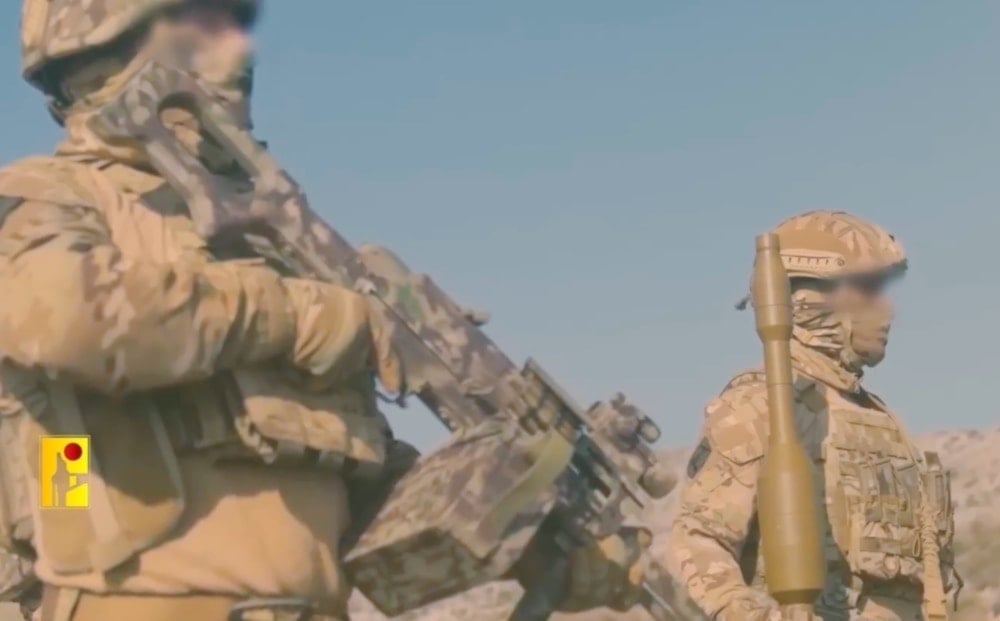Debunking the US–'Israel' fantasy for Lebanon: The Intercept
US-Israeli rumors of Hezbollah's downfall are overstated, and Israeli discussions of a post-Hezbollah Lebanon remain speculative.
-

A screengrab of a video showing fighters of the Islamic Resistance in Lebanon readying for confrontations in a short clip released October 14, 2024 (Hezbollah Military Media)
In an opinion piece for The Intercept, Beirut-based journalist Séamus Malekafzali shed light on the complexities of the ongoing Israeli invasion of Lebanon. While Israeli media portrays their military operations as a resounding success, with high-profile PR efforts showcasing captured territory and alleged Hezbollah deserters, the situation on the ground tells a different story.
Malekafzali noted that Israeli advances have rarely extended beyond border towns, and Hezbollah fighters remain active in the region, continuing to inflict casualties on Israeli forces.
He highlighted a recent drone strike by Hezbollah deep into Israeli territory, which killed soldiers at a military base near Haifa, along with missile strikes reaching Tel Aviv. Despite the assassination of key Hezbollah leaders, rumors of the group's downfall have been greatly exaggerated, according to Malekafzali.
Moreover, while "Israel" and the US are already discussing a post-Hezbollah Lebanon, a claimed popular uprising against the organization remains largely speculative. Malekafzali critiqued this vision, noting that Israeli leaders have kept the details intentionally vague, leaving their hopes for a civilian revolt against Hezbollah more as a rhetorical goal than a tangible plan.
Lapid’s vision overlooks Hezbollah’s stronghold and support base
Malekafzali appraised the proposal by Yair Lapid, former Israeli Prime Minister and current opposition leader, to reshape Lebanon in the wake of the Israeli invasion. Despite Lapid’s political differences with Prime Minister Benjamin Netanyahu, his plan for Lebanon closely mirrors Netanyahu’s, including a controversial call to reestablish the South Lebanon Army—a proxy force that "Israel" supported until 2000. Lapid suggested recruiting Lebanese soldiers with higher salaries, trained by French, Emirati, and American officers, rather than Israelis.
More strikingly, Lapid advocated for dissolving the Lebanese government and placing the country under an international mandate, after which new elections would be held to form a government that excludes Hezbollah.
Malekafzali highlighted the inherent absurdity and orientalism of this idea, noting that Hezbollah is not just a powerful military entity but also a political force with significant popular support, particularly in southern Beirut and parts of southern Lebanon. The movement, while not holding the majority in Lebanon’s parliament, garnered the most votes of any single party in the last election and is viewed by many Lebanese as a key defender against Israeli aggression, credited with helping expel Israeli forces in 2000 and rebuilding areas devastated during the 2006 war.
According to Malekafzali, while opposition to Hezbollah exists within Lebanon, the movement remained an integral part of Lebanese society, and any attempt to remove it entirely misunderstands its deep-rooted significance.
US seizes opportunity amid Lebanon war to push for new leadership
Malekafzali highlighted how the United States appears unbothered by "Israel’s" overtly aggressive plans in Lebanon. The US has refrained from advocating for a ceasefire, viewing the ongoing war as an opportunity to weaken Hezbollah’s influence.
As part of this strategy, Washington is reportedly pushing for the election of a new Lebanese president while assuming that Hezbollah’s focus is diverted. US envoy Amos Hochstein inadvertently hinted at this agenda during an interview with LBC, stating, “Until we select — once Lebanon selects a president.” In response to concerns raised by Lebanon’s parliamentary speaker about the safety of Hezbollah MPs, given "Israel’s" assassination strikes against Hezbollah leaders in Beirut, a U.N. coordinator admitted, “No one can guarantee that this will not happen.”
In Malekafzali's view, the United States is crafting an idealized vision of Lebanon, simultaneously engaging with Lebanese leaders and conducting diplomacy while promoting the notion of a future Lebanon where its people "can choose their own representatives."
This rhetoric, as per the author, mirrors George W. Bush's statements about Iraq under Saddam Hussein. However, despite this talk of democratic choice, there is little evidence that the majority of Lebanese citizens would elect representatives that align with US and Israeli approval.
As the US constructs this narrative, the Israeli military actions reflect a belief that Lebanon cannot be entrusted with "true democracy", prompting the expulsion of Lebanese residents from the south, the author wrote.
Israeli military spokesperson Daniel Hagari recently claimed that every house in a southern Lebanese village was part of Hezbollah’s infrastructure. Footage has surfaced showing Israeli troops demolishing entire villages with planted explosives.
The piece concluded by suggesting that the US and "Israel" may ultimately back a vision of Lebanon similar to what former Israeli Security Minister Moshe Dayan once envisioned, "One where the south is under Israeli control, and in the seat of power in Beirut, an installed leader who will want nothing more than to give Israel everything it wants."

 5 Min Read
5 Min Read








